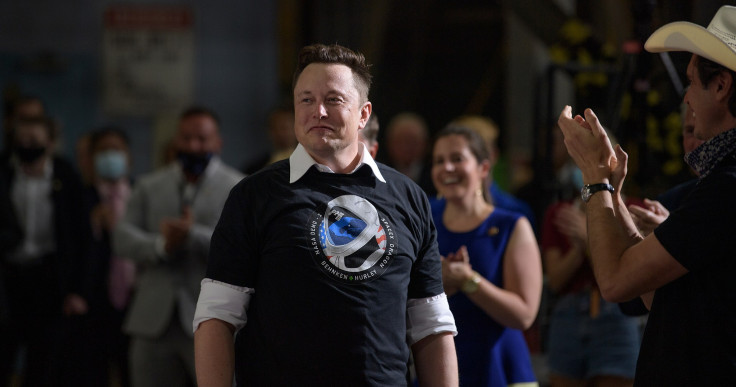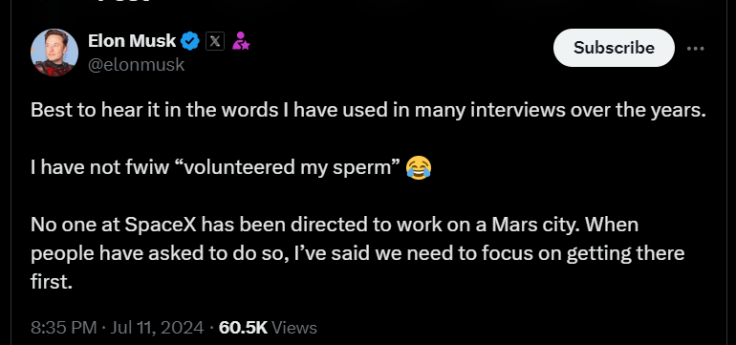Elon Musk 'Did Not' Volunteer His Sperm For Mars To Seed Space Colony: "Focus On Getting There First"
Musk is more interested on what currency to use in the Red Planet

Elon Musk vehemently refuted a recent New York Times report claiming he offered to donate sperm for a Martian colony. The July 11 article alleged Musk had quietly tasked his team with designing an off-world habitat suited to Mars' harsh environment.
The report detailed that Musk's team is investigating various facets of Martian colonisation. It claimed that one group is exploring the construction of "small dome habitats" using materials compatible with the Martian environment.
Meanwhile, another team is designing spacesuits to withstand the frigid Martian climate. The atmosphere is a thin mix composed primarily of carbon dioxide (95 percent) with a meagre 0.13 percent oxygen.
Another area of investigation is the feasibility of human reproduction on Mars. This necessitates a deep dive into the challenges of child-bearing in such an extreme environment. The New York Times quoted two anonymous sources alleging Musk had "volunteered his sperm to help seed a colony."
The NYT report suggests these nascent initiatives mark a shift towards more concrete Martian planning, reflecting Musk's accelerated timeline. In 2016, he estimated that a self-sustaining Martian civilisation would take 40-100 years.
However, in April, he told SpaceX employees he expects a million people to live there within 20 years. It's worth noting that in April, he set an ambitious goal for his astronautics company, aiming for a crewed landing on Mars within the next 7-9 months. This timeframe appears to have shifted since then.
"There's high urgency to making life multi-planetary," he said, according to a publicly posted video of his remarks. "We've got to do it while civilisation is so strong." However, he vehemently denied the New York Times' claims regarding his sperm contribution.
Sperm Donation Rumours Debunked
In an X post by Richard Hanania sharing the article, Musk clarified, "Best to hear it in the words I have used in many interviews over the years. I have not fwiw 'volunteered my sperm.'"

Musk further elaborated, "No one at SpaceX has been directed to work on a Mars city. When people have asked to do so, I've said we need to focus on getting there first."
Despite Musk's denial, the rumours about his sperm donation for Mars colonisation has proliferated across media and social media. This frenzy likely stems from Musk's previously declared ambition: a Martian city of one million by 2050.
Is Reproduction In Space Possible?
The idea of human procreation beyond Earth presents significant hurdles. Dr Adam Watkins, Associate Professor of Reproductive Biology at the University of Nottingham, spoke to Business Insider (BI), highlighting: "Studies have shown that you can effectively send freeze-dried sperm into space sealed, like freeze-dried coffee."
Dr Watkins elaborated that in vitro fertilisation (IVF) could be possible using such sperm and eggs. The resulting embryos could then be transferred to women who have already established themselves on Mars.
However, the complexities and potential dangers of space reproduction are vast. Dr. Kris Lehnhardt, leading NASA's research on medical systems for deep-space exploration, told BI, "We don't even know if it's possible for someone to become pregnant in space."
The harsh realities of space travel, including reduced gravity and intense radiation exposure, pose significant threats to a developing embryo or fetus.
Further complicating matters, Mars' gravity is a mere 38 percent of Earth's, potentially impacting pregnancy in unforeseen ways. The long-term effects of reduced gravity on human reproduction and development remain shrouded in speculation.
SpaceBorn United, a company pioneering research into IVF in space, is actively tackling these challenges. Their plan involves conducting space-based IVF experiments using mouse embryos, which will eventually progress to human embryos.
"When you look at what will be needed for us to be an off-planet species, that starts to stick out as one of the really, really big unknowns," David Cullen, a professor of space biotechnology at Cranfield University working with SpaceBorn United, told BI.
Building A Martian Economy
Beyond the technical and biological hurdles of colonising Mars, Elon Musk has also ventured into ideas regarding the economic system of a potential Martian society. Notably, he has suggested Bitcoin as a possible form of currency for Mars.
Beyond the technical and biological hurdles of colonising Mars, the SpaceX CEO has also explored ideas regarding the economic system of a potential Martian society. Notably, he has suggested Bitcoin as a possible form of currency for Mars. However, during a January X Spaces session, Musk initially shot down the idea due to the slow transaction times inherent to Bitcoin's network.
"It would make sense to use some kind of cryptocurrency on Mars; you couldn't use Bitcoin because the reconciliation is too long," Musk said.
However, upon further consideration, Musk conceded that Bitcoin might still be viable due to the relatively short communication delays between Earth and Mars. While the exact light travel time between the planets fluctuates, it's typically within the range of 3 to 22 minutes.
"Perhaps you can use Bitcoin to some degree, but it would be difficult to use it a lot on Mars," Musk concluded (via Voice of Crypto), hinting at the need for a Martian currency solution.
© Copyright IBTimes 2025. All rights reserved.






















